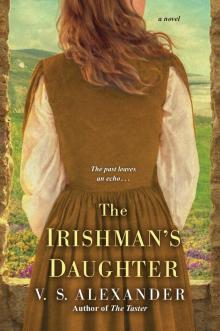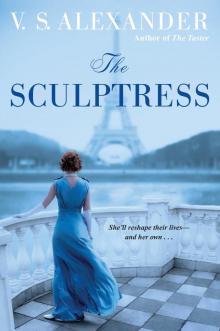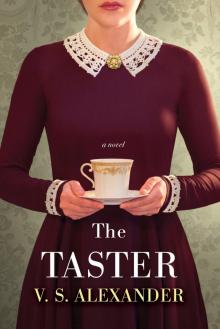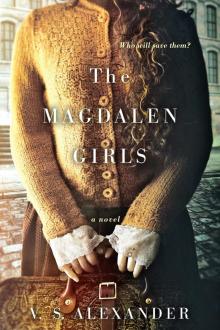- Home
- V. S. Alexander
The Irishman's Daughter Page 37
The Irishman's Daughter Read online
Page 37
“I’ve written them many times,” Briana said.
Her sister turned once again, this time with a frown on her face. “I know. But you may have the grippe with your baby nearly due, and Father and Rory deserve to know.”
“That’s comforting,” Briana said, and rolled over to face the wall.
Lucinda’s words drifted over her. “I also want to wish them a Merry Christmas. This may be the last chance I get.”
She lifted her head and said, “I think about them every night at dinner. You think about them, too, don’t you?”
“Yes,” Lucinda said, her head outlined by the yellow glow of the lamp.
She understood what her sister meant by “last chance”—she had pictured the same horrible consequence of the famine—Rory and her father dead. The cold enveloped Briana, and she couldn’t stop shaking. She closed her eyes and tried to sleep as the pen scratched across the paper.
* * *
Rory sat in the kitchen at Lear House, drawing near to the stove, which provided the only warmth in the manor. From the shuttered library came the sounds of books being thrown about, of the desk chair scraping against the floor. Irritation crawled over him—after all, he had saved Brian’s life, had kept watch on him while his father-in-law could barely sit on top of the pony. He had lugged three bags of Indian corn from the farm near Geesala and then loaded two on his pony and strapped one to Brian’s; he had sheared off the padlock to the kitchen with an ax; cleaned the rat droppings from the stove, table, and cabinets—all for one simple request: Brian was to keep away from the windows, be quiet and calm, and make the best of their tenuous situation.
Instead, Brian raved like a madman. It was not an easy time. The weather had been brutally harsh—snow had fallen in October—the cold and damp seemed to come from the ashen sky in relentless waves. The house sucked the heat away from them into its dark recesses. Rory longed for spring days when he could take a walk with Briana, perhaps see his brother off for fishing in Broadhaven Bay; but in Lear House he was imprisoned with his father-in-law, living like hermits through what promised to be a brutal winter. He was tired of watching for every step, listening for the sound of hooves that might signal the Constabulary or the dragoons come to drag them from their illegal haven, or worrying that smoke rising from the chimney might send a signal at night to the uninvited. He had no fear of the few remaining villagers, or those farmers who might wander back to the estate, because they knew Lear House’s history and could be trusted to keep a secret. Perhaps he could even aid them as well, if circumstances permitted. Outsiders, however, were a different story. They might unintentionally send out an alarm.
He leaned back in his chair, put his feet up on the table, and pulled the sleeves of one of Sir Thomas’s sweaters over his hands. The landlord had so many, Rory imagined he was in a goods store in Dublin the day he and Brian had rummaged through the Master’s clothes. It gave him great satisfaction to see the two of them standing in front of the upstairs looking glass clothed in such finery.
The landlord was soon relegated to the attic of his thoughts as he peered through the dark east window, which looked out upon the shattered remains of the tenant farms. The panes rippled with rain and blocked what little was left of the view; only the closest of the sodden mounds were visible through the glass. Rather than think about sunny days and warm clothes, he was much more concerned with how he and Brian would get through the winter with dwindling supplies and a madness that preyed upon his father-in-law. His actions reminded Rory much of what he had witnessed in Daniel Quinn. He couldn’t help but think it was a madness born of malnutrition, desperation, and loss.
It had taken him days to come to terms with the stillness they had experienced on the road back to Lear House. Was there a living creature stirring? Had they all been eaten—the birds, their eggs, the hare, the grouse, the berries, the roots . . . ? When they’d crossed the river at Bangor, Rory had expected to see people—Irishmen and women—like he was used to seeing on trips to Westport, but the village seemed deserted, as if those who lived there had been eaten by the earth itself. He cringed at the sight of a few dogs along the side of the road. In fact, he felt so sorry for one, he had wanted to coax him to Lear House, but he had nothing to feed any unnecessary animal. The hairy mutt soon joined others feasting upon a corpse partially frozen to the ground.
They had spotted dead along the trail that bordered Carrowmore Lake—not whole bodies but fragments, hands wrenched in the air, naked feet extending from ripped breeches. They passed by the sickening sights numbed by the fact that there was nothing they could do.
On the outskirts of Carrowteige, they came across the hut of a woman whom Rory knew by reputation only. Rumors had swirled that many lonely men and even Sir Thomas had taken refuge there on occasion. The hut had been leveled—the woman missing, perhaps buried under its remains. At the house of an elderly husband and wife, no such supposition was needed. The tangled bodies were intertwined with the sod and rocks, their home their burial mound. Carrowteige was as silent as any village they had traveled through. Through that deserted and deathly landscape, they had arrived at Lear House.
A book banged to the library floor, and Rory cringed. Anger coursed through his body, and he fought to quell it. Brian was ill and not to be blamed, but the older man’s outbursts risked revealing their hiding place.
He left the kitchen, shutting the door to keep in the heat. His father-in-law was sitting at the oak desk, the ledger books piled so high that only the top of his head showed in the dim light.
“Come to the kitchen,” Rory said. “It’s warm.” He looked at the disorderly desk, shaking his head. “Remember your promise.” He might as well have been talking to a two-year-old.
“Why can’t I make sense of these books?” Brian asked. “There should be plenty of money. Sir Thomas shouldn’t be angry with me.” He paused and placed his hands on a stack to his left. “Where’s Lucinda—she has a head for these things.”
Rory moved behind him. Brian had pulled a pair of satin breeches and a silk evening jacket over one of the landlord’s white nightshirts. The sight of the balding man dressed so made him chuckle despite the pathetic situation.
“Don’t you remember where Lucinda and Briana are?” Rory asked calmly.
“They should be inside,” Brian said. “It’s dark and they’ll get the switch if they don’t come in soon.”
Rory put his hand on Brian’s shoulder. “They’ve gone on a trip, but they’ll be back,” he said, attempting to mollify his father-in-law. Sadness swept over him as he watched the man paw at the books and then fiddle aimlessly with the pen.
Brian rubbed his temples. “When did they leave? Where are they?” His eyes grew moist. “Please come back,” he said to the air.
Rather than confuse him, Rory replied, “They’ve gone to find work, and as soon as they do, we’ll join them.” He knew his father-in-law would forget what he’d said by tomorrow.
Brian looked at the shuttered window with an expression of disbelief and then turned to Rory. “A trip? Where are they?”
He was about to guide his father-in-law into the kitchen when a knock on the front door reverberated through the hallway. He put a finger to his lips, skulked to the library door, and peered around its edge. Through the narrow strips of glass surrounding the entry, he observed the dark form of a man lurking in the murk. A shiver raced up his spine.
His father-in-law darted past him into the hall, the silk jacket swirling around his body. Before Rory could stop him he was at the glass, his nose pressed against the window. He put his right hand against the pane as did the figure outside. Brian turned, his eyes blazing with delight. “I know him . . . he’s a friend.”
The man outside the window was Daniel Quinn. Rory had not seen him since the night at The Black Ram at Westport, but his tipsy, happy appearance at that time had disintegrated to something akin to a skinny, bedraggled dog.
“Let him in,” Brian ordered, and shook the doo
r handle, not remembering that it was padlocked from the outside.
Rory didn’t know what to think as he listened to his father-in-law plead on behalf of the poet. Daniel Quinn wasn’t an outsider, but neither was he a villager nor tenant farmer. Upon hearing his poem in the public house, he had wondered about Quinn’s mental state. His suspicions about the poet’s hand in Blakely’s shooting had never abated. He had informed the constable, and now he had the poet in hand. If he was able to get Quinn to confess, he could clear himself. But could he be so callous? He’d have to think twice about sending a man to prison or transport. Blakely, whom he had no love for, had fled to the luxury of his Manchester home leaving the tenants to suffer. In this case, real justice had only nicked the owner.
On the other hand, he had pledged to help people, and Quinn was certainly someone who needed aid. Perhaps the poet could be of service. His father-in-law needed someone to look after him, especially on the days Rory might travel to Belmullet or Glencastle for his remaining shares of plundered supplies.
“My dear friend,” Brian repeated as he clawed at the glass. He turned on Rory and spat at his feet. “You are unkind, sir!” It was the first time his father-in-law had ever spoken harshly to him.
Rory shrugged it off, knowing that the man was not himself, but he knew the mood would turn foul if he didn’t let the poet in. Quinn might also hold a grudge against them if he was denied entry. He remembered the poem at The Black Ram recited in jest to the English sailors. A poet’s revenge could be fatal.
Rory drew close to the window. “Come to the back—the kitchen door.”
Clutching at his satin breeches, Brian raced to the kitchen.
Rory followed, still uncertain whether he had made the right decision. He waited for the knock before opening the door.
Daniel Quinn, shivering, his clothes shredded and soaked, stumbled past the door. His curly, once-black hair had turned almost gray, washing out an equally dreary face; his eyes sat like lifeless black rocks in their sockets. The poet gasped and teetered toward the warm stove.
Rory feared the man might die on the spot. Brian knelt over Quinn as if attempting to retrieve a memory from deep in his brain. It came to him after a few minutes, and he repeated the word “poet” many times without a flicker of recognition from the quivering man.
Rory rushed upstairs for a towel and then returned to strip the wet clothes off the poet. As he fumbled with Quinn’s jacket, the end of a smoking pipe protruded from a pocket, but it was a glint of light off metal that caught his attention. He opened the pocket to find the flute the poet had played at The Black Ram. He had only seen one other like it in his life—at the home of Frankie and Aideen Kilbane.
* * *
The Carlisles were kind people of privilege who embraced their place in Boston society and had a keen understanding of the servant’s role in their home as well. Therefore, Lucinda was expected to be at her station on most days, even when Briana’s condition worsened. She had ingratiated herself to Mrs. Carlisle with the promise that she would be happy to tutor their young son in numerous subjects before he started private school. Mrs. Carlisle took this offer with kind skepticism at first but soon realized that her employee had much to offer as a governess.
Lucinda had also come to respect the kindness, the hard work, and the dark-haired beauty of her landlady, Mrs. Coleman. The young woman would sit with Briana during the day, not only tending to her needs but schooling Quinlin and attending to the wants of her working husband. She became a saint in Lucinda’s eyes, one to whom she would be forever grateful for her attentions to Briana and the boy.
As the days progressed toward Christmas, Briana’s illness took a turn for the worse. What at first had seemed like a bad cold, or the grippe, turned into days of fever, drenched bedclothes, parched lips, and pleas for relief. Declan enlisted the help of Mr. Furey, the Irishman who had dispensed the medication to cure Quinlin, but the tinctures, the potions, and the powders did little to help Briana.
After a grueling night of serving at a festive party to mark the holiday, Lucinda asked Mrs. Carlisle for a few days off after the last of the guests had departed.
“What is this about?” The lady pressed her hands firmly against the waistline of her plaid taffeta dress.
“I’ve told you of my sister,” Lucinda said. “She’s been gravely ill for days now, made even more so by the fact that she carries a child.” Her eyes clouded over as she thought of Briana’s damp face, her hair plastered to the pillow in wet strings. She didn’t want to distress her mistress with details that might be too delicate for her employer’s stomach; on the other hand, she wanted Mrs. Carlisle to understand the severity of the situation. “She’s had trouble eating and sleeping. I fear most for the baby.”
“I had no idea,” the woman replied. “Why didn’t you come to me sooner?” She took a step back from Lucinda and withdrew her handkerchief from her sleeve. “Let the others finish tonight. Please do take the time to nurse your sister, but let us know of her progress.” She covered her mouth with the cloth. “We know of a doctor who may be able to help.”
“I’d be most grateful for your consideration,” Lucinda said.
“Dr. Scott,” Mrs. Carlisle replied almost immediately. “I’ll send him to you tomorrow morning.”
* * *
Dr. Jonathan Scott arrived at the Colemans’ shortly after one the next afternoon. Lucinda heard the door open, as well as the whoosh of the cold draft up the stairs. She opened the door of their second-floor room and peered down at the landing, where Mrs. Coleman was helping a man with his overcoat, umbrella, and bag while he wiped the muck from his calf-high boots. It had rained during the morning, turning what snow was left on the streets into a cold slush.
The doctor was not the man she had imagined. She had expected an aging, balding gentleman of bristling manner with unkempt facial hair and muttonchops. Instead Dr. Scott was a young man, probably in his midthirties, with a full head of brown hair, a finely trimmed mustache, and a light beard. From her first impression, she ascertained that he was confident, assured, but not boastful and ready to take on a challenge. Certainly, the health of her sister presented one.
His light blue eyes met her own as he climbed the stairs. Mrs. Coleman followed to facilitate the introduction. He failed to grasp her hand, possibly for some medical reason related to germs, but conveyed his pleasure upon their meeting with a slight smile and nod of his head. Mrs. Coleman went back downstairs, where she was keeping watch over Quinlin.
The formalities over, Lucinda led him to Briana’s bedside.
The doctor pulled up the desk chair and sat near the bed, studying her sister for several minutes. He placed the back of his hand upon Briana’s forehead and then withdrew it. Finally, he asked, “How long has she been like this?”
“For several days now. Her illness has gotten progressively worse.” Briana attempted to turn in bed but instead cried out in a long moan. The blood drained from Lucinda’s face. She had never felt so alone—not even on her way to England in her years as a governess, or crossing the Irish Sea and landing at Liverpool, or taking the carriage to Manchester to work for people she had never met in her life. In those times, she had always known that her father and sister would be waiting for her at home—at Lear House. Her sister, the only family she had on American soil, was ill and, as far as she knew, could be dying with her unborn child inside her. The possibility of that tragedy struck her like a blow to the heart.
The doctor rose, lifted the sweat-soaked blankets from Briana, and circled his hand first around her wrists and then her ankles. “What treatments has she received?” he asked after completing further examination.
Lucinda lowered her gaze, suddenly feeling ashamed that she’d had to leave her sister alone while she worked.
He must have sensed her distress, for he said, “I know you work for the Carlisles. The lady of the house told me that you had been exemplary on nearly all occasions and that you are quite educated. It�
�s rare to find so talented and indispensable a . . .” His face flushed.
“Servant?” She blushed as well, embarrassed by her profession. “On nearly all occasions?”
He shook his head. “I’m only conveying the message I received—I meant that you do not have time to properly care for your sister while you discharge your duties. Mrs. Carlisle is aware of your situation and wants to help.”
Had it been another day, she might have sparred with the doctor, telling him how many times she had wished to be anything but a servant in Boston, anywhere but in the employ of a wealthy American family. The Carlisles carried on with hardly a care in the world while her own family had sunk into poverty because of a potato blight. It was degrading to talk about, but Briana’s health was more important than challenging the doctor.
“I wish I could tell you more about her treatments; perhaps Mrs. Coleman can.” She sighed and wrung her hands. “I know she’s been given teas, ointments, warm sponge baths, cold compresses at night to soothe the fever. Nothing seems to help.”
The doctor eyed her, as if taking her in from head to toe. “When is your sister’s baby due?”
“Next month, sometime after the New Year.” She got the distinct impression that he was looking at her as if she was an equal, something she had rarely experienced from men. The feeling was refreshing, even soothing. Her own brother-in-law thought of her as nothing more than a sophisticated upstart, a pretentious social climber.
The doctor turned away and, strangely, inched around the room studying the windowsills and baseboards. At the corner where the north wall met the front of the house, he stopped and bent down. Straightening, he motioned for Lucinda to come over.
“Look.” He pointed to the dusty intersection of the floor and wall.
She saw nothing at first, until she leaned in and stared into the corner.
“They’re mouse droppings,” he said. “The little creatures can be nasty, carrying all kinds of diseases. Your sister may be suffering from an illness carried by vermin.”

 The Irishman's Daughter
The Irishman's Daughter The Sculptress
The Sculptress The Taster
The Taster Her Hidden Life
Her Hidden Life The Magdalen Girls
The Magdalen Girls